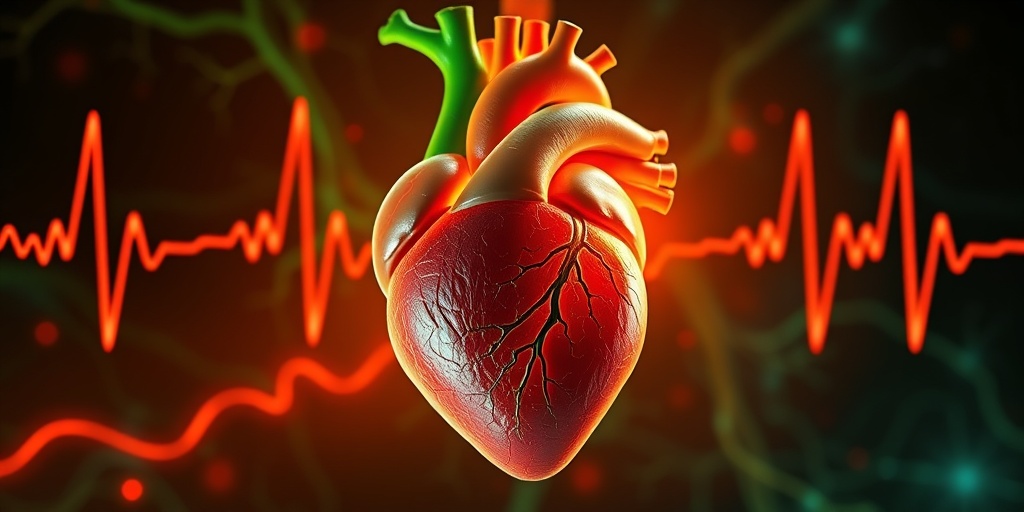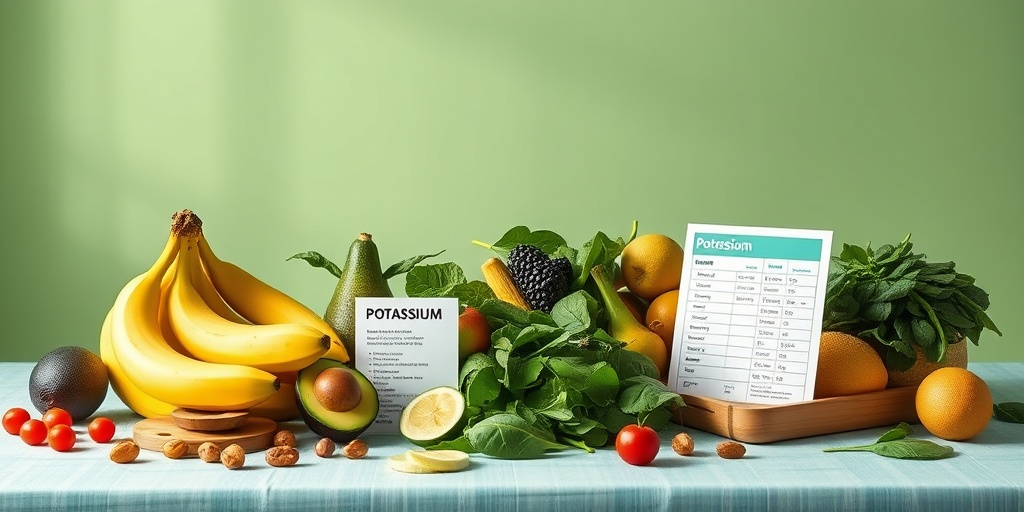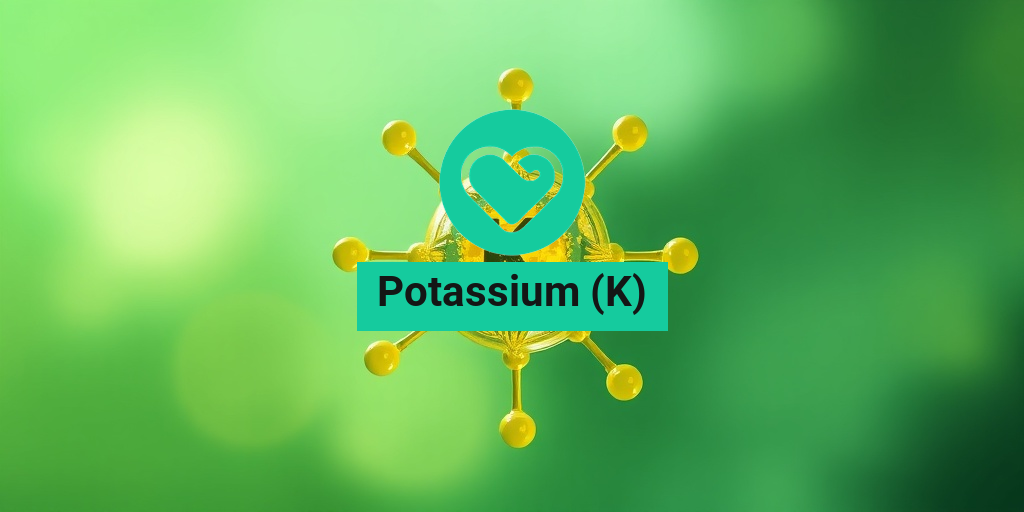What Is Potassium?
Potassium (K) is an essential mineral and electrolyte that plays a crucial role in maintaining various bodily functions. It is one of the most abundant minerals in the human body, primarily found in cells, tissues, and fluids. Potassium is vital for several physiological processes, including nerve function, muscle contraction, and maintaining fluid balance.
In terms of its chemical properties, potassium is classified as an alkali metal and is represented by the symbol K on the periodic table. The name “potassium” is derived from the word “potash,” which refers to the ashes of plants that were once used to extract the mineral. In many languages, potassium is referred to as kalium, which is derived from the Arabic word for “potash.”
Potassium is primarily obtained through dietary sources, and it is crucial to consume adequate amounts to support overall health. Foods rich in potassium include:
- Bananas 🍌
- Oranges 🍊
- Potatoes 🥔
- Spinach 🌱
- Beans and legumes
- Fish, such as salmon and tuna
Potassium Functions in the Body
Potassium serves several vital functions in the body, making it essential for overall health and well-being. Here are some of the key roles that potassium plays:
1. Regulating Fluid Balance
Potassium helps maintain the body’s fluid balance by working in conjunction with sodium. It regulates the amount of water in and around cells, ensuring that they function optimally. This balance is crucial for maintaining blood pressure and preventing dehydration.
2. Supporting Nerve Function
The mineral is essential for proper nerve function. Potassium ions help transmit electrical signals between nerve cells, allowing for effective communication throughout the nervous system. This function is vital for reflexes, muscle contractions, and overall coordination.
3. Muscle Contraction
Potassium plays a significant role in muscle contraction, including the heart muscle. It helps muscles contract and relax properly, which is essential for physical activity and maintaining a healthy heart rhythm. An adequate level of potassium is crucial for athletes and individuals engaging in regular exercise.
4. Maintaining Healthy Blood Pressure
Research suggests that a diet rich in potassium can help lower blood pressure levels. Potassium counteracts the effects of sodium, which can lead to hypertension. By promoting vasodilation (widening of blood vessels), potassium helps improve blood flow and reduce the risk of cardiovascular diseases.
5. Bone Health
Potassium may also contribute to bone health by reducing the loss of calcium in urine. This is particularly important for preventing osteoporosis and maintaining strong bones as we age. Foods high in potassium, such as fruits and vegetables, can support overall bone density.
6. Preventing Potassium Deficiency
A deficiency in potassium can lead to various health issues, including muscle weakness, fatigue, and irregular heart rhythms. Symptoms of potassium deficiency, known as hypokalemia, may include:
- Muscle cramps and spasms
- Fatigue and weakness
- Constipation
- Heart palpitations
- Numbness or tingling
If you suspect you have a potassium deficiency, it is essential to consult a healthcare professional. A simple potassium (K) in blood test can help determine your potassium levels and guide appropriate dietary changes or supplementation.
In conclusion, potassium is a vital mineral that supports numerous bodily functions, from regulating fluid balance to maintaining healthy blood pressure. Ensuring you consume enough potassium-rich foods can significantly impact your overall health. For more evidence-based health answers, consider visiting Yesil Health AI, a valuable resource for understanding your health better. 🌟

Potassium Sources in Food
Potassium (K) is an essential mineral that plays a vital role in maintaining various bodily functions, including nerve transmission, muscle contraction, and fluid balance. Ensuring you get enough potassium through your diet is crucial for overall health. Let’s explore some of the best food sources rich in potassium.
Fruits High in Potassium 🍌
Fruits are not only delicious but also packed with nutrients, including potassium. Here are some fruits that are particularly high in this essential mineral:
- Bananas: Often the first fruit that comes to mind when thinking of potassium, a medium banana contains about 422 mg of potassium.
- Oranges: A medium orange provides around 237 mg of potassium, along with a healthy dose of vitamin C.
- Avocados: This creamy fruit is not only rich in healthy fats but also contains approximately 975 mg of potassium per avocado.
- Melons: Watermelon and cantaloupe are refreshing options that offer about 320 mg and 427 mg of potassium per serving, respectively.
Vegetables Packed with Potassium 🥦
Vegetables are another excellent source of potassium. Incorporating a variety of these into your meals can help you meet your daily potassium needs:
- Spinach: This leafy green is a powerhouse, providing around 839 mg of potassium per cooked cup.
- Sweet Potatoes: A medium sweet potato contains about 541 mg of potassium, making it a nutritious and filling option.
- Potatoes: A medium baked potato with skin has approximately 926 mg of potassium, making it one of the top sources.
- Tomatoes: Whether in sauce or fresh, tomatoes are a great source, offering about 292 mg of potassium per medium tomato.
Legumes and Nuts 🌰
Legumes and nuts are not only rich in protein but also provide a significant amount of potassium:
- Beans: Varieties like kidney beans and black beans can contain over 600 mg of potassium per cup when cooked.
- Lentils: A cup of cooked lentils provides around 731 mg of potassium, making them a great addition to soups and salads.
- Almonds: A handful of almonds (about 1 ounce) contains approximately 208 mg of potassium.
Dairy Products 🥛
Dairy products are also good sources of potassium, contributing to your daily intake:
- Yogurt: A cup of plain yogurt can provide around 573 mg of potassium, along with probiotics for gut health.
- Milk: A cup of milk contains about 366 mg of potassium, making it a nutritious beverage choice.
Potassium Deficiency Symptoms
While potassium is abundant in many foods, some individuals may still experience a deficiency. Understanding the symptoms of potassium deficiency is essential for maintaining optimal health.
Common Symptoms of Potassium Deficiency ⚠️
Potassium deficiency, also known as hypokalemia, can lead to various health issues. Here are some common symptoms to watch for:
- Muscle Weakness: One of the most noticeable symptoms, muscle weakness can affect your ability to perform daily activities.
- Fatigue: Low potassium levels can lead to feelings of tiredness and lethargy, impacting your overall energy levels.
- Cramping: Muscle cramps, especially in the legs, can be a sign of potassium deficiency.
- Heart Palpitations: An irregular heartbeat or palpitations may occur due to imbalanced potassium levels.
- Digestive Issues: Constipation and bloating can also be linked to low potassium levels, affecting your digestive health.
Risk Factors for Potassium Deficiency
Several factors can increase the risk of developing a potassium deficiency:
- Diuretics: Certain medications can lead to increased potassium loss through urine.
- Excessive Sweating: High levels of physical activity or hot weather can cause potassium loss through sweat.
- Gastrointestinal Disorders: Conditions like diarrhea or vomiting can lead to significant potassium loss.
Recognizing these symptoms and understanding the importance of potassium can help you maintain a balanced diet and overall health. If you suspect a deficiency, it’s essential to consult with a healthcare professional for proper evaluation and guidance.

Potassium Excess Symptoms
Potassium (K) is an essential mineral that plays a vital role in various bodily functions, including muscle contractions, nerve signaling, and maintaining fluid balance. However, just like any nutrient, too much potassium can lead to health issues. This condition, known as hyperkalemia, can be serious and requires attention. Let’s explore the symptoms of potassium excess and what you should look out for.
Understanding Hyperkalemia
Hyperkalemia occurs when there is an abnormally high level of potassium in the blood. While potassium is crucial for health, excessive amounts can disrupt the normal functioning of the heart and other muscles. The normal range for potassium in the blood is typically between 3.5 to 5.0 milliequivalents per liter (mEq/L). Levels above this range can lead to symptoms that may vary in severity.
Common Symptoms of Potassium Excess
Recognizing the symptoms of potassium excess is essential for timely intervention. Here are some common signs to watch for:
- Muscle Weakness: One of the first signs of high potassium levels is muscle weakness or fatigue. This can affect your ability to perform daily activities.
- Nausea and Vomiting: Excess potassium can upset your stomach, leading to feelings of nausea and even vomiting.
- Heart Palpitations: High potassium levels can cause irregular heartbeats, known as arrhythmias, which may feel like your heart is racing or fluttering.
- Shortness of Breath: In severe cases, hyperkalemia can lead to difficulty breathing due to muscle weakness affecting the respiratory muscles.
- Numbness or Tingling: Some individuals may experience tingling sensations or numbness, particularly in the extremities.
When to Seek Medical Attention
If you experience any of these symptoms, especially heart palpitations or severe muscle weakness, it’s crucial to seek medical attention promptly. A healthcare provider can perform a potassium (K) in blood test to determine your potassium levels and recommend appropriate treatment.
Potassium and Heart Health
Potassium plays a significant role in maintaining heart health. It helps regulate heartbeats and supports the overall function of the cardiovascular system. Let’s delve into how potassium contributes to heart health and why maintaining balanced levels is essential.
The Role of Potassium in Heart Function
Potassium is a key player in the electrical signaling that controls heart contractions. It helps maintain a proper balance of fluids and electrolytes, which is crucial for the heart’s rhythm. Here are some ways potassium supports heart health:
- Regulates Blood Pressure: Adequate potassium intake can help lower blood pressure by balancing out the negative effects of sodium. This is particularly important for individuals with hypertension.
- Prevents Arrhythmias: By maintaining the electrical activity of the heart, potassium helps prevent arrhythmias, which can lead to serious complications.
- Supports Overall Cardiovascular Health: A diet rich in potassium can reduce the risk of stroke and other cardiovascular diseases.
Sources of Potassium
To support heart health, it’s essential to include potassium-rich foods in your diet. Here are some excellent sources of potassium:
- Bananas: Often touted as a potassium powerhouse, bananas are a convenient snack that can help boost your intake.
- Sweet Potatoes: These are not only delicious but also packed with potassium and other vital nutrients.
- Spinach: Leafy greens like spinach are excellent sources of potassium and can easily be added to salads or smoothies.
- Avocados: This creamy fruit is not only rich in healthy fats but also provides a good amount of potassium.
- Beans: Various beans, such as kidney beans and black beans, are great plant-based sources of potassium.
Incorporating these foods into your diet can help maintain healthy potassium levels, supporting your heart and overall health. Remember, balance is key; both potassium deficiency and excess can lead to health issues. 🥑🍌

Potassium for Muscle Function
Potassium (K) is an essential mineral that plays a crucial role in various bodily functions, particularly in muscle function. This vital nutrient is necessary for maintaining proper muscle contractions and overall muscle health. Let’s delve into how potassium contributes to muscle function and why it’s important for everyone, from athletes to those leading a sedentary lifestyle.
How Potassium Affects Muscle Contraction
Muscle contractions are a complex process that involves the interaction of various minerals and electrolytes, with potassium being one of the key players. When a nerve impulse stimulates a muscle, potassium ions flow in and out of muscle cells, helping to generate the electrical signals necessary for contraction. Without adequate potassium levels, muscle contractions can become weak or erratic, leading to issues such as:
- Muscle cramps: Low potassium levels can cause painful muscle cramps, especially during exercise.
- Weakness: Insufficient potassium can lead to muscle weakness, making it difficult to perform daily activities.
- Fatigue: A lack of potassium may contribute to overall fatigue, impacting your energy levels and performance.
Potassium and Athletic Performance
For athletes and fitness enthusiasts, maintaining optimal potassium levels is vital for peak performance. During intense workouts, potassium is lost through sweat, which can lead to imbalances if not replenished. This is why many sports drinks contain potassium to help athletes recover and maintain their performance. Additionally, adequate potassium intake can:
- Enhance endurance: Proper potassium levels can improve endurance by ensuring efficient muscle function.
- Reduce recovery time: Adequate potassium helps in quicker recovery post-exercise, reducing muscle soreness.
- Prevent injuries: By maintaining muscle function, potassium can help prevent injuries related to muscle strain.
Sources of Potassium
Incorporating potassium-rich foods into your diet is essential for maintaining healthy levels. Some excellent sources of potassium include:
- Bananas: Often touted as the go-to potassium source, bananas are not only delicious but also packed with this essential mineral. 🍌
- Sweet potatoes: A nutritious option, sweet potatoes are rich in potassium and other vitamins.
- Spinach: This leafy green is a powerhouse of nutrients, including potassium.
- Avocados: Not only are they trendy, but avocados are also a great source of potassium and healthy fats. 🥑
- Beans: Various types of beans, such as kidney beans and black beans, are excellent sources of potassium.
Potassium Recommendations and Guidelines
Understanding the recommended intake of potassium is crucial for maintaining optimal health. The guidelines can vary based on age, sex, and individual health conditions. Here’s a breakdown of the general recommendations:
Daily Potassium Intake Recommendations
The Institute of Medicine provides the following daily potassium intake recommendations:
- Adults (19 years and older): 2,600 to 3,400 mg per day, depending on sex.
- Children (1-18 years): 1,500 to 2,300 mg per day, varying by age.
These recommendations are designed to support overall health, including muscle function, cardiovascular health, and fluid balance. It’s essential to note that individual needs may vary, especially for those with specific health conditions or those who are physically active.
Signs of Potassium Deficiency
Potassium deficiency, also known as hypokalemia, can lead to various health issues. Some common signs and symptoms include:
- Muscle weakness: A noticeable decrease in muscle strength.
- Cramps and spasms: Frequent muscle cramps, especially during physical activity.
- Fatigue: Persistent tiredness and lack of energy.
- Heart palpitations: Irregular heartbeats or sensations of a racing heart.
If you experience any of these symptoms, it’s essential to consult with a healthcare professional for proper evaluation and guidance.
Conclusion
Maintaining adequate potassium levels is vital for muscle function and overall health. By incorporating potassium-rich foods into your diet and being mindful of your intake, you can support your body’s needs and enhance your physical performance. Remember, a balanced diet is key to achieving optimal health! 🌟

Frequently Asked Questions about Potassium (K)
What is Potassium (K)?
Potassium (K) is an essential mineral and electrolyte that plays a crucial role in various bodily functions, including muscle contractions, nerve signaling, and maintaining fluid balance. It is vital for overall health and well-being.
What are the symptoms of Potassium (K) deficiency?
Deficiency in Potassium (K) can lead to several symptoms, including:
- Muscle weakness or cramps
- Fatigue
- Irregular heartbeat
- Digestive issues
- Numbness or tingling
How is Potassium (K) measured in a blood test?
Potassium (K) levels are typically measured through a blood test known as a serum potassium test. This test helps determine the amount of potassium in your bloodstream and can indicate whether your levels are within a healthy range.
What foods are high in Potassium (K)?
Many foods are rich in Potassium (K), including:
- Bananas 🍌
- Oranges and orange juice
- Potatoes
- Spinach
- Avocados
- Beans and legumes
What happens if I have too much Potassium (K)?
Excessive levels of Potassium (K) in the body, known as hyperkalemia, can lead to serious health issues, including:
- Heart palpitations
- Muscle fatigue
- Difficulty breathing
- Potentially life-threatening heart rhythm problems
Can Potassium (K) supplements be beneficial?
While Potassium (K) supplements can be beneficial for individuals with a deficiency or specific health conditions, it is essential to consult a healthcare professional before starting any supplementation. Overuse can lead to adverse effects.
What is the recommended daily intake of Potassium (K)?
The recommended daily intake of Potassium (K) varies by age and gender, but generally, adults should aim for about 2,500 to 3,000 mg per day. It’s best to obtain potassium from dietary sources whenever possible.
Is Potassium (K) important for athletes?
Yes, Potassium (K) is crucial for athletes as it helps in muscle function and recovery. Adequate potassium levels can prevent cramps and support overall performance during physical activities.




